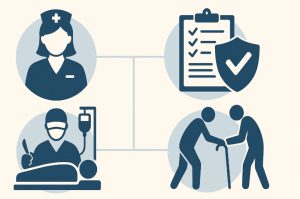In the UK, all health and social care providers are legally required to comply with specific legislation to ensure safe, effective, and high-quality services. Central to this framework is the Health and Social Care Act 2008, which outlines the responsibilities of providers and regulators alike.
Compliance is not only a statutory duty but a cornerstone of delivering accountable care. This article explores the key legislation, regulations, and standards that every provider must understand and implement to remain legally compliant.
What Is The Primary Legislation Governing Health And Social Care Providers In The UK?

The primary piece of legislation that governs health and social care providers in the United Kingdom is the Health and Social Care Act 2008. This act marked a significant transformation in how care is delivered and regulated. It created the legal basis for a unified and comprehensive system that combines oversight of both health and adult social care services.
At the core of this legislative framework is the establishment of the Care Quality Commission (CQC). The CQC is responsible for:
- Registering care providers who meet necessary standards
- Monitoring, inspecting, and rating care services
- Enforcing legal requirements and taking action against non-compliant providers
The act assigns both regulatory powers and enforcement responsibilities to the CQC, ensuring that all providers operate within the legal framework.
How Does The Health And Social Care Act 2008 Define Regulatory Responsibilities?
Under this act, care providers are required to register if they perform regulated activities. These include the delivery of medical treatments, personal and nursing care, diagnostic procedures, and more.
Providers are legally obligated to ensure that their services are safe, effective, and respectful of service users’ dignity.
The act outlines the responsibilities of the CQC, which include:
- Conducting inspections based on five key questions: Is the service safe, effective, caring, responsive, and well-led?
- Issuing statutory notices when breaches occur
- Imposing fines or cancelling registrations in extreme cases
Care providers must be able to demonstrate that they continuously meet the required standards. This is not a one-time process but an ongoing commitment to excellence and accountability.
What Are The Key Provisions In The Health And Social Care Act 2008 (Regulated Activities) Regulations 2014?

The Health and Social Care Act 2008 (Regulated Activities) Regulations 2014 serves as a critical supplement to the main Act by defining which services are subject to regulation and what specific requirements providers must meet to operate lawfully in England.
These regulations form the practical backbone of the legislation by setting out clear, enforceable expectations for all providers involved in delivering health and adult social care.
Purpose Of The Regulations
The key purpose of the 2014 Regulations is to ensure that anyone who carries out a regulated activity does so in a way that is safe, effective, compassionate, and high-quality. It ensures that service users are protected from avoidable harm and treated with dignity and respect. These regulations apply across a wide range of service types, from hospitals and clinics to care homes and domiciliary care providers.
Definition Of Regulated Activities
The regulations clearly identify and define a number of care-related activities that must be registered with the Care Quality Commission (CQC). If a provider carries out any of these without being registered, they are committing an offence under the law.
Common regulated activities include:
- Personal care: Assistance with hygiene, dressing, eating, and other daily living activities.
- Treatment of disease, disorder or injury: Medical or therapeutic intervention, including outpatient services and rehabilitation.
- Surgical procedures: Any procedure involving instruments to investigate or treat a condition.
- Nursing care: Care provided or supervised by a registered nurse.
- Diagnostic and screening procedures: X-rays, blood tests, ultrasound, and other assessments.
- Maternity and midwifery services: Care provided during pregnancy, childbirth, and postnatal periods.
- Management of supply of blood and blood-derived products: Activities related to transfusion and blood services.
These activities are considered to pose varying degrees of risk to service users and therefore require mandatory registration and monitoring.
Fundamental Standards Of Care
The 2014 Regulations introduced a set of Fundamental Standards that all providers must meet. These are non-negotiable standards of quality and safety below which care must never fall.
Some of the key standards include:
- Person-centred care: Care must be tailored to the individual’s preferences, needs, and values.
- Dignity and respect: Service users must be treated with dignity at all times.
- Consent: Providers must ensure they have obtained proper consent before any care or treatment.
- Safety: Systems must be in place to reduce risks and prevent harm.
- Safeguarding from abuse: Measures must exist to protect people from abuse, improper treatment, and neglect.
- Staffing: Sufficient numbers of suitably qualified, competent, and experienced staff must be available.
- Complaints handling: A transparent and effective complaints process must be in place.
- Good governance: Providers must have robust systems to assess, monitor, and improve service quality.
- Premises and equipment: Facilities must be clean, secure, and appropriately maintained.
These standards form the criteria against which the CQC assesses services during inspections.
Registration Requirements
The regulations outline criteria and procedures for becoming a registered provider. A provider must:
- Submit a Statement of Purpose, detailing the nature of the services they intend to provide.
- Identify and appoint a Registered Manager where applicable, particularly for more complex or high-risk services.
- Demonstrate compliance with all relevant policies, including infection control, fire safety, and risk assessments.
In addition, the CQC must be informed of any significant changes, such as alterations in management, the addition of new services, or incidents that impact care quality.
Enforcement And Accountability
The regulations give the CQC legal powers to take action against providers who fail to meet the standards. This may include:
- Issuing warning notices
- Imposing fines
- Suspending or cancelling registration
- Bringing criminal prosecutions in serious cases
Accountability lies not only with the provider entity but also with individual managers and directors who may be held personally responsible if found negligent.
Overview Of Key Provisions In The 2014 Regulations
| Area of Regulation | Key Requirements |
| Regulated Activities | Must register with CQC for personal care, medical treatment, diagnostics, etc. |
| Fundamental Standards | Must deliver care that is safe, dignified, and person-centred |
| Staffing and Training | Staff must be qualified, competent, and adequate in number |
| Consent and Safeguarding | Proper consent procedures and safeguarding policies must be in place |
| Complaints and Governance | Must provide clear complaint handling and quality assurance systems |
| Equipment and Premises | Facilities and tools must be clean, safe, and suitable for care delivery |
Impact On Providers
These regulations have a direct operational impact on how care services are run. Providers must continuously review their policies, train their staff, maintain clear documentation, and be prepared for CQC inspections at any time.
By embedding these provisions into everyday practices, care organisations not only meet their legal obligations but also contribute to the wider goal of enhancing the safety and quality of care delivered across the health and social care system in England.
How Do The Care Quality Commission (Registration) Regulations 2009 Affect Providers?
The Care Quality Commission (Registration) Regulations 2009 define the formal process that providers must follow to become registered. This process ensures that only capable and responsible entities are authorised to deliver care services.
To qualify for registration, a provider must demonstrate:
- That they are fit and proper persons to manage care services
- That they have appropriate premises, staff, and procedures in place
- That they understand and can comply with the legal obligations tied to their activities
These regulations apply across all regulated activities and are designed to ensure consistency and reliability in service provision.
Requirements For Provider Registration Under The 2009 Regulations
| Requirement | Description |
| Fit and Proper Person Test | Evaluation of the provider’s character, competence, and financial viability |
| Statement of Purpose | Clear outline of the services provided and objectives |
| Suitable Premises and Equipment | Proof that locations are safe, hygienic, and fit for purpose |
| Qualified Staff | Evidence of trained and competent staff members |
| Policies and Procedures | Documentation on safeguarding, consent, and complaints handling |
What Are The Statutory Duties Of Care Providers Under CQC Regulations?

Once registered, care providers are legally bound to adhere to the fundamental standards outlined by the CQC. These duties are in place to ensure the delivery of safe, high-quality care.
Core statutory obligations include:
- Keeping accurate and up-to-date records
- Gaining informed consent from service users
- Protecting users from harm, neglect, or abuse
- Employing competent, vetted staff
- Maintaining a clean and safe care environment
These duties form the basis for CQC inspections and influence a provider’s overall rating. Persistent failure to meet them can result in enforcement action, fines, or the revocation of the provider’s licence.
Why Is Compliance With Healthcare Legislation Critical For Care Providers?
Compliance serves both a legal and ethical function in the health and social care sector. It is essential not only for operational legality but also for building trust with service users and stakeholders.
Consequences of non-compliance can be severe. They include:
- Financial penalties and legal costs
- Reputational damage
- Service suspension or closure
- Civil or criminal liability for individuals in charge
Beyond avoiding penalties, compliance ensures that care providers deliver services that genuinely benefit users. It enhances staff morale, improves patient outcomes, and contributes to a more effective care system overall.
How Can Care Providers Stay Updated With Regulatory Changes?

Keeping abreast of changes in legislation is critical for ongoing compliance. Regulatory requirements are periodically reviewed and updated to reflect changes in policy, public expectations, and emerging care challenges.
To stay informed, care providers should:
- Monitor updates from official government publications
- Participate in industry events and professional networks
- Maintain communication with legal and regulatory advisors
- Invest in training programs and compliance software
An effective strategy includes reviewing internal policies at least annually and updating them as new legislation is enacted or existing rules are amended.
Methods To Stay Updated On Care Legislation
| Method | Benefit |
| Government Bulletins | Official and authoritative information |
| Legal Advisors | Tailored interpretation and risk analysis |
| Industry Conferences and Webinars | Exposure to real-world insights and case studies |
| Compliance Software and Alerts | Real-time notifications on regulatory changes |
| Internal Audits and Policy Reviews | Ensures policies align with current legal expectations |
What Guidance Is Available To Help Providers Understand Legislation?
Health and social care legislation in the UK is detailed and ever-evolving, making it essential for providers to have access to clear, accurate, and up-to-date guidance.
While legislation such as the Health and Social Care Act 2008 and its associated regulations set the legal requirements, guidance documents and support tools help providers interpret, implement, and stay compliant with these legal duties in real-world settings.
Role Of Guidance In Supporting Compliance
Guidance plays a crucial role in bridging the gap between legal texts and practical application. While acts and regulations set out what must be done, guidance explains how to do it. This is particularly important in health and social care, where providers must often make nuanced decisions about service delivery, risk management, and individual care needs.
By following established guidance, providers can:
- Ensure consistent and lawful practices
- Prepare effectively for CQC inspections
- Strengthen internal governance systems
- Reduce risk of enforcement action or legal liability
- Improve the quality of care for service users
Key Sources Of Guidance For Care Providers
Several reputable organisations offer structured, in-depth guidance that supports compliance with legal and regulatory expectations.
1. Care Quality Commission (CQC)
As the primary regulator for health and social care in England, the CQC publishes comprehensive guidance for both new and existing providers. This includes:
- Registration requirements
- Enforcement policies
- Inspection frameworks based on the five key questions: safe, effective, caring, responsive, and well-led
- Guidance on meeting the fundamental standards of care
Providers can refer to CQC materials to understand how to meet the expectations during inspections and what documentation or evidence is required to demonstrate compliance.
2. Department Of Health And Social Care (DHSC)
The DHSC develops and oversees health and social care policy in England. It issues statutory guidance and codes of practice related to infection control, safeguarding, consent, and the delivery of integrated care. Many of these documents are updated periodically in response to public health developments, policy changes, or reviews of existing legislation.
3. Skills For Care
This workforce development charity provides detailed support on staff recruitment, training, and retention—key aspects of regulatory compliance. It offers resources such as:
- Induction frameworks
- Training materials aligned with the Care Certificate
- Managerial guidance on supervision, appraisals, and performance reviews
Skills for Care’s materials help providers ensure their staff are competent and compliant with requirements under the Regulated Activities Regulations.
4. Social Care Institute For Excellence (SCIE)
SCIE provides evidence-based guidance, tools, and resources that support excellence in adult social care. It is especially helpful for developing best practices in:
- Person-centred care
- Mental capacity and consent
- Safeguarding adults
- Co-production and service user involvement
Their tools and training packages are widely used across the sector to build staff understanding and support quality improvement.
5. National Institute For Health And Care Excellence (NICE)
Although better known for its clinical guidelines, NICE also publishes recommendations that influence regulatory expectations in care settings. These include:
- Quality standards for health and social care
- Public health guidance
- Clinical pathways and treatment protocols
Using NICE guidelines helps providers demonstrate that they are following evidence-based practices, which supports compliance and improves outcomes.
Key Guidance Sources For Care Providers
| Source | Area of Guidance | Usefulness for Providers |
| Care Quality Commission (CQC) | Registration, inspections, enforcement, compliance | Helps with meeting regulatory obligations and inspections |
| Department of Health and Social Care (DHSC) | Legislation, policy updates, statutory codes | Offers authoritative guidance on evolving legal standards |
| Skills for Care | Workforce development, training, recruitment | Supports compliant staffing and HR practices |
| Social Care Institute for Excellence (SCIE) | Practice-based tools, safeguarding, best practices | Enhances quality and user engagement |
| National Institute for Health and Care Excellence (NICE) | Clinical and care standards | Promotes evidence-based, safe, and effective care |
Importance Of Internal Guidance And Training

In addition to external resources, care providers must also develop internal policies and training systems that reflect current legislation and best practices. This includes:
- Staff handbooks and compliance manuals
- Induction and ongoing training programmes
- Templates for care plans, risk assessments, and incident reporting
- Procedures for handling complaints, consent, and safeguarding
Internal guidance should be reviewed regularly, especially following any legislative updates or inspection feedback. Senior management must take responsibility for ensuring that staff understand not just the ‘what’ of legislation, but the ‘why’—helping embed compliance into the culture of the organisation.
Legal Advice And Specialist Consultants
While general guidance is widely available, complex cases may require bespoke legal advice. This is particularly relevant for:
- Large or multi-site providers
- Services with complex care needs (e.g., mental health, palliative care)
- Providers facing enforcement or litigation
Specialist legal firms and compliance consultants can provide tailored advice, conduct mock inspections, and support the development of legally robust systems.
Continuous Improvement Through Guidance
Compliance is not a one-time task. It is a continuous journey that evolves with legislation, case law, best practices, and societal expectations. Leveraging expert guidance ensures that providers do more than just meet the minimum standards—they build sustainable, high-quality care environments that benefit both staff and service users.
Conclusion
Health and social care providers in the UK operate within a tightly regulated environment designed to protect users and uphold service quality. The Health and Social Care Act 2008, along with its supporting regulations, forms the cornerstone of this regulatory framework.
By complying with the law, providers ensure they are legally protected, ethically responsible, and professionally credible. Ultimately, understanding and adhering to this legislation is not just a legal obligation but a commitment to delivering safe, effective, and person-centred care.
Frequently Asked Questions (FAQs)
What is the difference between the Health and Social Care Act and its regulations?
The Act sets the overall framework and principles, while the regulations provide specific details about what activities are covered and how providers must comply.
Do small care providers need to register under CQC regulations?
Yes, even small-scale or individual providers must register with the CQC if they carry out regulated activities as defined in the regulations.
How often do the Health and Social Care regulations change?
While the Act itself changes infrequently, supporting regulations like the Regulated Activities Regulations are updated more regularly to reflect evolving care standards.
Are care home managers legally responsible for compliance?
Yes, registered managers have legal responsibility for ensuring their service complies with all relevant legislation and CQC requirements.
What are the penalties for breaching the Health and Social Care Act?
Penalties can include fines, cancellation of registration, criminal prosecution, and even imprisonment in cases of serious breaches.
Is the CQC a government body or independent regulator?
The CQC is an independent regulator, but it was established by the Health and Social Care Act 2008 and operates under powers granted by Parliament.
How can care providers access official legislative documents?
Official documents can be accessed through legislation.gov.uk or via trusted legal platforms like LexisNexis, though terms may apply.








